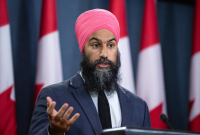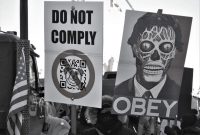Support strong Canadian climate journalism for 2025
OTTAWA — Prime Minister Justin Trudeau and Ottawa Mayor Jim Watson both accused Ontario Premier Doug Ford of shirking his duty to help disperse the "Freedom Convoy" that paralyzed the national capital's downtown core, a public inquiry heard Tuesday.
Watson's long-awaited testimony began Tuesday morning at the Public Order Emergency Commission, which is examining the circumstances that led to the federal government's emergency declaration in February, and the measures taken to deal with the weeks-long occupation of downtown Ottawa.
Watson told the inquiry that within the first few days of the protest, which began on Jan. 28, it was clear that Ottawa police were "completely outnumbered" — and he was impatient with the amount of time it took to get reinforcements.
By Feb. 7, about two weeks into the protest, documents filed with the commission show that police were asserting their resources were "depleted." Ottawa police told the city that 250 officers from partner agencies were not available yet — and as such, they were looking at "smaller scale enforcement."
"I think even a layperson like myself recognized that the Ottawa Police Service was outnumbered in terms of the resources they had," Watson said, adding that they still had "a whole city" to police.
Watson said all levels of government must take responsibility that they didn't act fast enough. "There was no question when you look back in hindsight at what happened, there were several failure points along the way, whether it was the city, provincial or federal governments."
He said that Ford "felt it was a waste of time" to participate in meetings between the three levels of government.
A transcript and summary of a Feb. 8 phone call shows Watson and Trudeau discussed frustrations that Ford's government wasn't more involved.
Watson told Trudeau that the provincial solicitor general, Sylvia Jones, was being "disingenuous" about the number of Ontario Provincial Police officers who were responding, reads the document provided to the commission.
Trudeau replied: "Ford has been hiding from his responsibility on it for political reasons as you highlighted, and important that we don’t let them get away from that, and we intend to support you on that."
Ford is not on the list of witnesses expected to testify before the commission.
On Monday, he told reporters that the use of the Emergencies Act was necessary to end an "unacceptable" situation and said he stood "shoulder to shoulder" with Trudeau throughout the situation.
Zachary Zarnett-Klein, spokesperson for Ontario's solicitor general, said in a statement that "politicians do not, and should not, direct specific police operations."
"During the occupation our government remained focused on providing the tools our policing partners needed to bring the situation to an end," the statement said.
Public Safety Minister Marco Mendicino backed Ford's insistence that the federal and provincial governments were in lockstep, despite the released transcript.
The prime minister and premier have both said that they were "standing shoulder to shoulder," he said after a Liberal cabinet meeting on Tuesday.
Mendicino said the testimony and documents produced for the inquiry so far show the lengths the three levels of government were going to to communicate about the problem and that police were doing everything they could to end it.
The hearings have also shown the extreme impact the protest was having on local businesses and residents, he said.
"This was, after all, an unprecedented public order emergency. We had to take the decision of invoking the Emergencies Act to give police the additional tools to restore public order, and it worked."
In his testimony Tuesday, Watson questioned why the intelligence gathered by all levels of government did not have accurate information about how many people were coming to the city and how long they planned to stay.
According to testimony from city manager Steve Kanellakos on Monday, the city believed the majority of people would be gone after the weekend.
But the commission saw evidence Monday that the city was warned that convoy demonstrators intended to dig in their heels.
That included an email from the "Canada United Truckers Convoy," forwarded to top city officials and Watson on Jan. 25, which said protesters were trying to book hotels for "a minimum of 30 days."
Police also had information from a local hotel association suggesting protesters were planning to stay for an extended period, and wrote in a Jan. 26 report shared with the city that "all open source information and our interactions with organizers indicate that this will be a significant and extremely fluid event that could go on for a prolonged period."
Watson said Tuesday that police should have installed jersey barriers to prevent protesters from getting into the downtown area, particularly onto Wellington Street.
"We allowed that major street — and it bled into the residential streets — to be taken over by a group of people that had no respect for the law and no respect for the people of our city," he said.
Wellington Street was the "prize pig," he said, where protesters could set up a stage and have “these vulgar flags … with the backdrop of Parliament Hill like they’d taken over the country."
In the days before the Emergencies Act was invoked, city officials and convoy organizers negotiated a deal to move semi trucks out of residential neighbourhoods and onto the street in front of Parliament Hill.
It resulted in some vehicles, including trucks, being moved out of residential streets and either in front of the Hill or out of the city altogether. "I believe that we did our best to live up to the agreement, as did truckers who did move, and we appreciate that," Watson said.
The federal Liberal government invoked the Emergencies Act on Feb. 14, granting police extraordinary temporary powers in an attempt to clear the protests that had jammed downtown streets for nearly three weeks.
Watson testified that he believes the Emergencies Act helped bring an end to the protests.
This report by The Canadian Press was first published Oct. 18, 2022.
— With files from Mia Rabson.





Comments